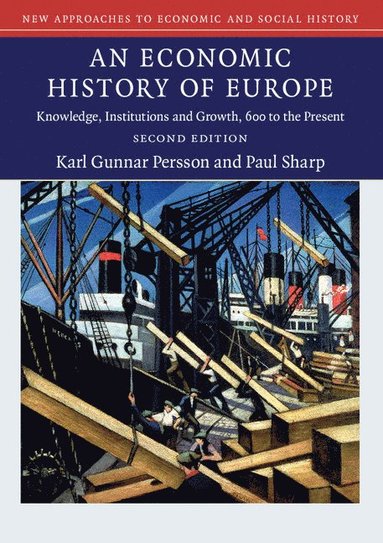
- Format
- Häftad (Paperback)
- Språk
- Engelska
- Antal sidor
- 285
- Utgivningsdatum
- 2015-03-12
- Upplaga
- 2
- Förlag
- Cambridge University Press
- Medarbetare
- Sharp, Paul
- Illustratör/Fotograf
- 36 b, w illus 4 maps 14 tables
- Illustrationer
- 36 b/w illus. 4 maps 14 tables
- Volymtitel
- An Economic History of Europe: Knowledge, Institutions and Growth, 600 to the Present
- Dimensioner
- 244 x 173 x 15 mm
- Vikt
- Antal komponenter
- 1
- Komponenter
- Paperback
- ISBN
- 9781107479388
- 636 g
An Economic History of Europe
Knowledge, Institutions and Growth, 600 to the Present
- Skickas från oss inom 7-10 vardagar.
- Fri frakt över 249 kr för privatkunder i Sverige.
Passar bra ihop
De som köpt den här boken har ofta också köpt Peak Human av Johan Norberg (pocket).
Köp båda 2 för 552 krKundrecensioner
Fler böcker av Karl Gunnar Persson
-
Grain Markets in Europe, 1500 1900
Karl Gunnar Persson, Persson Karl Gunnar, Charles Feinstein
-
Economic History of Europe
Karl Gunnar Persson, Paul Sharp
-
Grain Markets in Europe, 1500-1900
Karl Gunnar Persson
Recensioner i media
'... this book is a convenient reference work for economic, humanities, and social science research related to European economic development, particularly the spatial relationship of economic activities. Even so, those focused outside of Europe will also find the book valuable.' Enn Lun Yong, Fudan Journal of the Humanities and Social Sciences
Övrig information
Karl Gunnar Persson is Emeritus Professor at the Department of Economics, University of Copenhagen and has taught comparative economic history and globalization studies over five decades. He has published widely in the leading economic history journals and was the founding editor of European Review of Economic History. His previous monographs include Pre-Industrial Economic Growth: Social Organization and Technological Progression in Europe (1988) and Grain Markets in Europe, 1500-1900: Integration and Deregulation. Educated in Sweden, he is a member of the Royal Danish Academy of Sciences. Paul Sharp has been an Associate Professor at the Department of Business and Economics at the University of Southern Denmark since 2012. He completed his PhD in economics at the University of Copenhagen in 2009, after studying at King's College London and the University of Copenhagen. The main focus of his work is on economic and agricultural history and he is currently working on a co-authored book on the early history of the Danish dairy industry. He has published widely in economics, history, and economic history journals.
Innehållsförteckning
Part I. The Making of Europe; Part II. Europe from Obscurity to Economic Recovery; Part III. Population, Economic Growth and Resource Constraints; Part IV. The Nature and Extent of Economic Growth in the Pre-Industrial Epoch; Part V. Institutions and Growth; Part VI. Knowledge, Technology Transfer and Convergence; Part VII. Money, Credit and Banking; Part VIII. Trade, Tariffs and Growth; Part IX. International Monetary Regimes in History; Part X. The Era of Political Economy - from the Minimal State to the Welfare State in the Twentieth Century; Part XI. Inequality among and within Nations - Past, Present, Future; Part XII. Globalization and its Challenge to Europe.
Du kanske gillar
-
Atomic Habits
James Clear
Trade paperback (UK) -
Remaking the World
Jerrold Seigel
Inbunden -
Peak Human
Johan Norberg
Inbunden -
Trading Game
Gary Stevenson
Häftad


